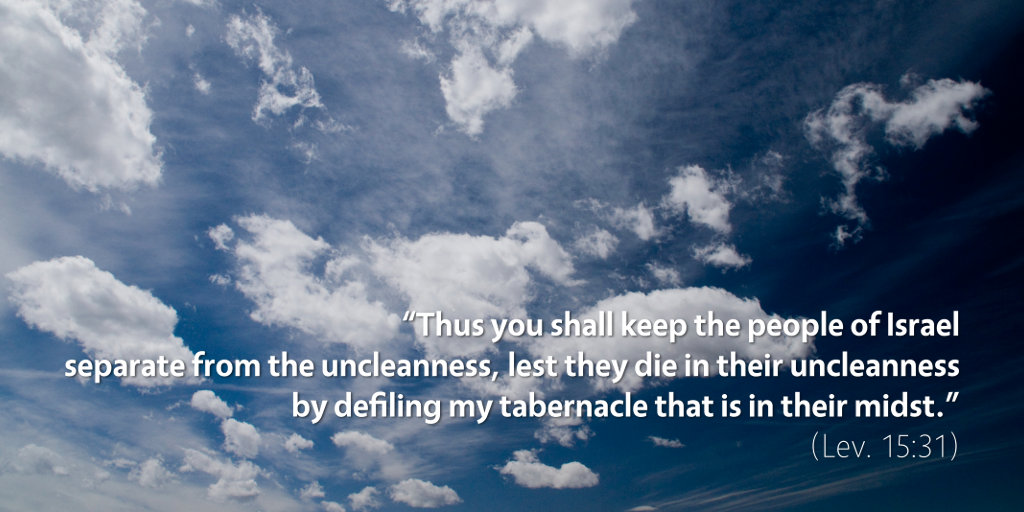Bible Readings for April 11th
Leviticus 15 | Psalm 18 | Proverbs 29 | 2 Thessalonians 3
Leviticus 15 underscores the fact that the theology of cleanness wasn’t always something to do with outright sinfulness, or even abnormal disease. In fact, there were routine ways in which all Israelites were counted to be unclean at regular intervals through normal—and even perfectly healthy—bodily functions.
So, in Leviticus 15, we see a range of possibilities for being rendered ceremonially unclean. Any man who had a discharge—that is, probably from some kind of infection (Lev. 15:2–3)—or an emission of semen, whether through a nocturnal emission or through intercourse (Lev. 15:16–18), or anyone who came into contact with such a man (Lev. 15:4–12) was thereby unclean.1
Or, whenever a woman menstruated (Lev. 15:19), or if she had a discharge of blood not related to menstruation (Lev. 15:25), that woman was unclean until she was healed. And again, if anyone came into any contact whatsoever with such a woman (Lev. 15:19–27), that person was also rendered unclean.
Just as a normal, healthy childbirth made a woman unclean until she went through the appropriate purification process (Lev. 12), so also normal bodily functions (e.g., discharges from infection) and healthy bodily functions (semen emissions and menstruation) would leave Yahweh’s people unclean until purified.
Nowhere is there any suggestion that these people had specifically sinned in some way. But, listen to the reason Yahweh gives as to why he would insist on such thorough precautions: “Thus you shall keep the people of Israel separate from their uncleanness, lest they die in their uncleanness by defiling my tabernacle that is in their midst” (Lev. 15:31).
The principle was simple: the corruption of the fall was contagious, so the Israelites had to prevent any of that corruption from defiling Yahweh or his tabernacle.
This theology helps us to understand better the story of the woman who suffered from a discharge of blood for twelve years, as we read about in Matthew 9. This woman was unclean because of her discharge, and so she should have kept her distance from Jesus. Nevertheless, she reached out to touch the fringe of his garment, and immediately she was healed (Matt. 9:20–21).
Jesus might have been offended that the woman would touch him in her uncleanness—she had touched the Word who became flesh and tabernacled among us (John 1:14)—but his response was gracious: “Take heart, daughter; your faith has made you well” (Matt. 9:22).
Holiness under the old covenant was weak and fragile, liable to be contaminated. The glory of Jesus, then, was that he did what the old covenant could not: he healed, cleansed, and sanctified the sick, unclean, and unholy.
Where uncleanness was contagious in the old covenant, it is now the holiness of Jesus that is contagious, transforming miserable sinners into radiant children of the Most High God through Jesus’ life, death, and resurrection.2
1 Allen P. Ross, Holiness to the LORD: A Guide to the Exposition of the Book of Leviticus (Grand Rapids, MI: Baker Academic, 2002), 306–7.
2 See, e.g., Craig L. Blomberg, Contagious Holiness: Jesus’ Meals with Sinners (Downers Grove, IL: InterVarsity Press, 2005).
Podcast: Play in new window | Download (5.7MB) | Embed
Subscribe: Apple Podcasts | RSS | More

Scripture quotations are from The Holy Bible, English Standard Version copyright © 2001 by Crossway Bibles, a division of Good News Publishers. Used by permission. All rights reserved.


